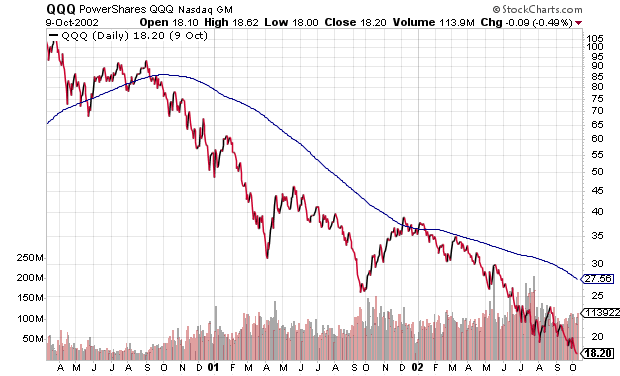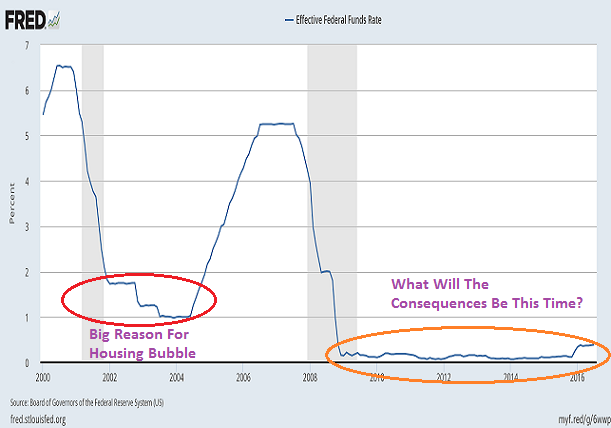Ignore The Election Cycle… Be Conscious Of The Stock Market Cycle
Pacific Park Financial Inc. | Oct 18, 2016 12:32AM ET
Here are a number of incontrovertible facts:
1. A bull market in stocks ends every bear market
2. A bear market in stocks ends every bull market
3. The Federal Reserve cannot prevent a bear market in stocks from eventually occurring
A new stock market bull in October of 2002 terminated the tech wreck (3/10/00-10/09/02) that had terrorized investors for two-and-a-half years. The new upswing (10/02-10/07) happened in spite of a recent recession; it occurred even as the nation’s leaders debated going to war in the Middle East. Yet few demonstrated the confidence to buy stocks at significant price discounts in late 2002. On the contrary. A great many individuals let their fears overwhelm them.
Trepidation makes people forget that good times for stocks will return. It makes them doubt that a new bull market will eventually stop a bear mauling. Perhaps ironically, the financial media lead people further astray. Near the tech bear’s bottom, the cover of Smart Money magazine read, “BEYOND STOCKS: Wall Street may have lost its luster, but there are other great investments out there.”
If fear is the primary emotion that leads investors to forget that bulls replace bears, greed makes them forget that bears wrap up bullish half-cycles. In the 1990s, overzealous folks believed 15%-20% annualized stock gains were a birthright. Dazzling dot-com IPOs had been blazing a path. And traditional valuation methodologies – price-to-earnings, price-to-sales, Tobin’s Q, market cap-to-GDP – seemed to have lost their relevancy.
Indeed, near the bull market peak in 1999, media mega-stars began to label Warren Buffett as a doddering old fool. Who was he to question the “New Economy?”
Few had taken the opportunity to reduce their tech stock exposure at exorbitant price premiums in 2000. Turn-of-the century piggishness caused many to lose sight of the fact that a bear market would take down the rampaging bull. The S&P 500 logged -48%, the NASDAQ Composite registered -76% and PowerShares QQQ Trust Series 1 (NASDAQ:QQQ) clocked in with -80%.

Since the 1990s record-setting bull and the 2000-2002 devastating bear, we have seen the pattern repeat repeat itself. The five years of stock gains in the mid 2000s (10/02-10/07), augmented by a runaway real estate train, nurtured greed and complacency. The financial crisis of 2008 obliterated portfolios as well as conviction that stocks could ever go up. And, not surprisingly, stocks have been rocketing for seven and a half years, registering the third longest uptrend in history.
In an investment world characterized by cyclicality, then, will you be prepared for the high probability of bearish price depreciation ahead? Or will you ignore six consecutive quarterly declines in corporate earnings? Will you dismiss 20%-50% overvaluation across virtually every traditional metric? Will you continue to view ultra-low interest rates as “justifying” bullish price movement indefinitely, in spite of concrete historical evidence that those ultra-low interest rates cannot stop the inevitability of a stock bear?
Recent history alone should make investors a bit less arrogant. The 500 basis point lowering by the Fed in the early 2000s neither stopped the 2000-2002 bear nor the economic recession that accompanied it. And when the Fed lowered its overnight lending rate 500 basis points in 2008, it was unable to keep the S&P 500 from its monstrous -57% showing let alone prevent the Great Recession.

Many believe that the Fed’s creation of trillions of electronic dollar credits to buy government bonds through quantitative easing or “QE” in 2009 and beyond prevented a Greater Depression. That may or may not be the case. It is the case, however, that quantitative easing (i.e., QE1, QE2, Operation Twist, QE3, etc.) sparked a mammoth stock rally, but only after a catastrophic bear devastated participant portfolios.
Now more than ever, then, it is critical to recognize that the Fed cannot prevent a bear from eventually materializing. For one thing, central bank policy makers blew balloons in previous asset bulls (e.g., stocks, bonds, real estate, etc.) by reducing borrowing costs, only to find that they were unable to prevent those balloons from bursting in 2000 and 2008. Second, and perhaps more importantly, the Federal Reserve’s 30-year experiment of greeting every economic hiccup or market maelstrom with monetary easing has enticed households, companies and governments to borrow irresponsibly.
What do I mean by borrow irresponsibly? Take a look at Federal Reserve leadership over the last three decades. For thirty years and counting, policy makers at the Fed have been indirectly responsible, as well as directly responsible through QE, for ever-decreasing borrowing costs.
What happened to households in this period? They borrowed far more than they took home in real personal income. Notice the debt line (in red) as it ran parallel to disposable income prior to Alan Greenspan’s arrival circa 1986. After Greenspan came onto the scene? The slope of the debt line steepened.
Worse yet, since 2001, Americans have borrowed in excess of their take-home. Even the Great Recession only brought about a period of brief deleveraging before American households began borrowing in excess yet again. (Low interest rates are great, right?)
Now consider what has transpired since central banks around the world determined that they must prop up bankrupt governments. Do those governments stop borrowing in excess? Sadly, they accelerate it. In America, we now simply hope to pay back the interest on our debts. Even that would not be possible if longer-term rates came anywhere close to normalizing. (But low rates are great, right?)
Keep in mind, corporations were far better than drunken sailor governments and households until the turn of the century. Unfortunately, the Fed hooked them as well. Notice the steepening of the slope on high grade corporate borrowing in the 2000s. More critically, pay attention to the doubling of corporate debt in the eight years since the financial crisis.
It gets worse. By a host of measures – business debt to GDP, debt-to-EBITDA, interest coverage ratio – corporate debt is hitting unsustainable levels. Even members of the Federal Reserve themselves are beginning to realize that their policies have had unintended consequences. In the minutes from the most recent Fed meeting, “a few participants expressed concern that the protracted period of very low interest rates might be encouraging excessive borrowing and increased leverage in the nonfinancial corporate sector.”
Granted, policy makers may have had the best of intentions. On the flip side, in the 30 years of Federal Reserve rate-manipulating policies, credit booms have led to credit busts. Why would anyone believe that this time will be different?
I am not suggesting that an investor abandon his stock holdings. I am suggesting that the risk of actual financial loss today is higher than many anticipate. It follows that lowering your exposure to the risk – raising some cash, increasing credit quality, trimming back riskier equity holdings – will give you greater peace of mind when the storm hits. It will also provide you with the capital to acquire beaten-down assets at bargain prices.
Disclosure: Gary Gordon, MS, CFP is the president of Pacific Park Financial, Inc., a Registered Investment Adviser with the SEC. Gary Gordon, Pacific Park Financial, Inc, and/or its clients June hold positions in the ETFs, mutual funds, and/or any investment asset mentioned above. The commentary does not constitute individualized investment advice. The opinions offered herein are not personalized recommendations to buy, sell or hold securities. At times, issuers of exchange-traded products compensate Pacific Park Financial, Inc. or its subsidiaries for advertising at the ETF Expert web site. ETF Expert content is created independently of any advertising relationships.
Trading in financial instruments and/or cryptocurrencies involves high risks including the risk of losing some, or all, of your investment amount, and may not be suitable for all investors. Prices of cryptocurrencies are extremely volatile and may be affected by external factors such as financial, regulatory or political events. Trading on margin increases the financial risks.
Before deciding to trade in financial instrument or cryptocurrencies you should be fully informed of the risks and costs associated with trading the financial markets, carefully consider your investment objectives, level of experience, and risk appetite, and seek professional advice where needed.
Fusion Media would like to remind you that the data contained in this website is not necessarily real-time nor accurate. The data and prices on the website are not necessarily provided by any market or exchange, but may be provided by market makers, and so prices may not be accurate and may differ from the actual price at any given market, meaning prices are indicative and not appropriate for trading purposes. Fusion Media and any provider of the data contained in this website will not accept liability for any loss or damage as a result of your trading, or your reliance on the information contained within this website.
It is prohibited to use, store, reproduce, display, modify, transmit or distribute the data contained in this website without the explicit prior written permission of Fusion Media and/or the data provider. All intellectual property rights are reserved by the providers and/or the exchange providing the data contained in this website.
Fusion Media may be compensated by the advertisers that appear on the website, based on your interaction with the advertisements or advertisers.